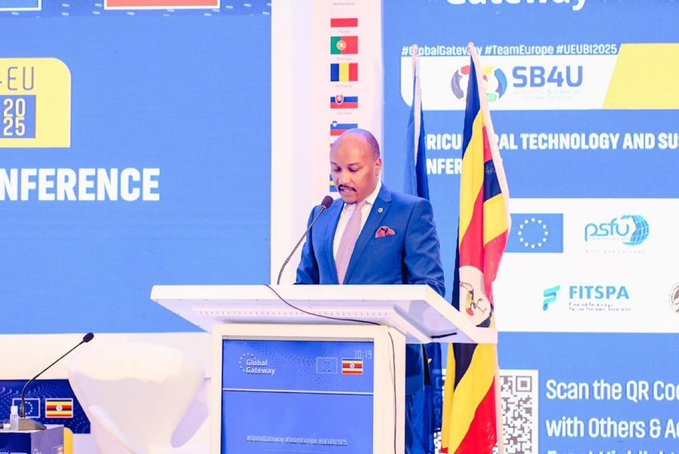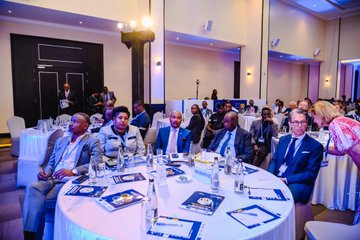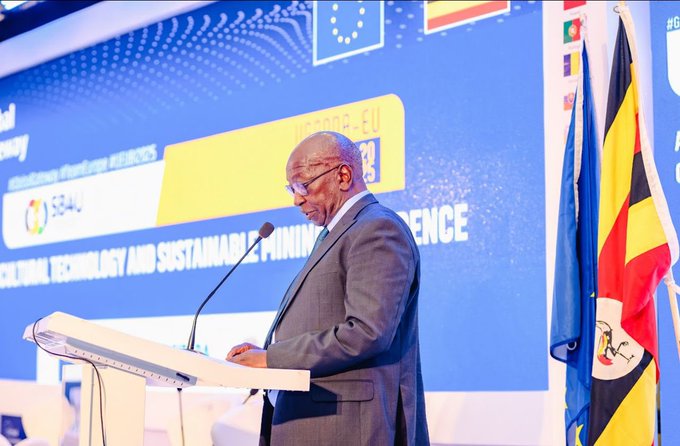The Chairman of the Private Sector Foundation Uganda (PSFU), Humphrey Nzeyi, delivered a keynote speech at the Uganda-EU Business Forum, held at Mestil Hotel, emphasising the deepening economic partnership between Uganda and the European Union (EU).
The forum, attended by high-ranking government officials, ambassadors, and business leaders, provided a platform to discuss key investment opportunities and trade relations.
Strengthening Uganda-EU Trade Relations
Nzeyi underscored the forum’s alignment with Uganda’s strategic objectives, highlighting two priority sectors: agricultural technology (AgriTech) and sustainable mining.
“Our focus is on boosting productivity, market access, and financial inclusion in agriculture through innovation,” he stated. “Additionally, Uganda’s vast untapped mineral resources present significant investment opportunities, particularly in responsible and value-added mining.”

The Chairman noted that the recent enactment of the Mining and Minerals Bill 2021 had catalysed both foreign and domestic investor interest in Uganda’s mineral wealth, valued at over US$620.5 billion.
He highlighted key minerals such as gold, copper, cobalt, nickel, vermiculite, and rare earths, as well as the world-class iron ore deposits in Muko, Kigezi, which boast 99.4% purity.
The Role of PSFU in Trade Facilitation
Nzeyi outlined PSFU’s pivotal role in Uganda’s private sector, representing over 340 business associations and 3.5 million enterprises.

He highlighted past initiatives such as Uganda’s self-imposed ban on fresh fruit and vegetable exports to the EU in 2015 to improve standards, which PSFU successfully managed through pre-testing programs.
These efforts led to the EU lifting the ban on Ugandan pepper exports, a testament to the effectiveness of public-private sector collaboration.
“PSFU remains committed to supporting businesses in export readiness, ensuring compliance with international standards such as ISO certification, and facilitating regulatory approvals,” he emphasised.

Expanding Market Access to the EU
With the EU offering access to 27 countries and a consumer base of over 449 million people, Uganda’s trade trajectory with the bloc has seen remarkable growth. Uganda’s exports to the EU have doubled from 450 million Euros in 2020 to approximately 900 million Euros in 2025, reflecting a balanced trade relationship.
Nzeyi projected that by the end of 2025, the EU would overtake Asia as Uganda’s top export destination. He highlighted coffee as the largest export to the EU, accounting for 60% of Uganda’s shipments, alongside other key exports such as tea, cocoa beans, fish, sesame, sunflower seeds, vanilla, flowers, and cotton.
Conversely, Uganda imports high-value manufactured goods from the EU, including pharmaceuticals, cereals, chemicals, and machinery. In May 2024 alone, Uganda’s imports from the EU totalled US$805 million, with significant purchases of food, live animals, and industrial equipment.

EU’s Contribution to Foreign Direct Investment
The EU remains Uganda’s largest source of foreign direct investment (FDI), contributing over 38% of total FDI inflows. The Chairman emphasized that Uganda had created a conducive investment environment, bolstered by platforms such as Sustainable Business for Uganda (SB4U), which facilitates EU investments in the country.
“Our trade and investment partnership continues to grow, and we are on course to achieving our target of 1 billion Euros in exports to the EU,” he affirmed.
Insights from the Minister of Trade, Industry, and Cooperatives
The Minister of Trade, Industry, and Cooperatives, Hon. Francis Mwebesa, reinforced Uganda’s commitment to expanding trade ties with the EU.

He noted that Uganda’s total trade volume with the EU reached EUR 1.5 billion in 2022, with a positive trade balance of EUR 800 million in exports against EUR 700 million in imports.
“The bond between Uganda and the EU isn’t just about trade; it’s a story of mutual growth and shared benefits,” he said. “Our coffee, fish, and flowers are ambassadors of Ugandan excellence in the European market, while EU machinery and pharmaceuticals support our industrial progress.”
Panel Discussion on AgriTech and Smallholder Farming
A key highlight of the forum was a panel discussion on “The Potential of AgTech in Transforming Smallholder Agriculture,” moderated by Sarah Kagingo, Vice Chairperson of PSFU.

Panellists discussed how digital tools and technology-driven solutions such as soil testing and online extension services could revolutionize farming in Uganda.
Brian Lwettute, CEO of Agri Yields, emphasised the importance of real-time data for farmers, stating that technology-driven solutions could help improve crop yields and resource efficiency.
William Luyinda also shared insights on empowering Micro, Small, and Medium Producers (MS&Ps) through diversification, digital tools, and sustainable farming practices.
Key takeaways from the discussion included: enhancing efficiency and productivity for smallholder farmers, improving market access and financial services, increasing resilience to climate change, encouraging youth participation in agriculture and promoting environmentally friendly farming practices.










